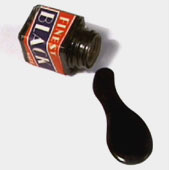A few days ago, The New York Times published an article about a guy who claims to have come up with an algorithm that will predict whether or not your script will be a box office hit. Among his pearls of wisdom is the following statement:
“Demons in horror movies can target people or be summoned,” Mr. Bruzzese said in a gravelly voice, by way of example. “If it’s a targeting demon, you are likely to have much higher opening-weekend sales than if it’s summoned. So get rid of that Ouija Board scene.”
Also, audiences apparently really like sidekicks. I think the old Hollywood execs figured that one out back when typewriters were the hot technology. After all, the wisecracking best friend is a cliche for a reason. Anyway, I admit, I do find the algorithm idea interesting, but I also find it depressing because it’s yet another way in which we’re monetizing every single aspect of our lives. And, look, it’s not like I have a problem with making money. I don’t. I understand that the movie industry, just like any other industry out there, needs to make money. We all have to eat and, believe me, I’m one girl who respects food. But I also think it’s possible to make money and make a really good story. I don’t think that art and commerce necessarily exclusive.
The old time movie moguls wanted to make the big bucks, but they also cared about the quality of the movies they made. And, yes, even then people like Fitzgerald and Buñuel accused Hollywood flicks of being formulaic and there was a lot of junk being made even in the Golden Age of Cinema, but there was still respect for telling a good story. Hell, I’d even argue that storytelling is right up there with prostitution as the world’s oldest profession. It’s a skill that, if done well, really doesn’t even need any technology at all. You take a modern 9 year-old kid and tell him a great tale and you got his attention, Nintendo notwithstanding. I know because in the past year, I’ve been spending time with a 9 year-old boy. I take him to his after-school program once a week.
As a ploy to keep him from running away from me on our walks — he is rambunctious, after all, as he should be–, I started telling him true stories from history.
In the process, I’ve learned a thing about what appeals to little boys (and I think this has a lot in common with what appeals to me, an ancient lady by his standards), but it’s also taught me about the crucial elements of storytelling. What makes a good story? The answer is simple. It doesn’t matter how stirring the tale, if I have not established the main characters as believable people, his interest lags. What’s interesting is that if I’ve done a good job of this, he will still be riveted, even if initially the story was a turn-off. For instance, one time I started telling him about Ellen and William Craft’s escape to freedom. The Crafts were two runaway slaves who were married to each other and his first reaction was to stop me in my tracks.
“Stop,” he protested, his voice dripping with disgust. “I don’t want to hear a LOOOOOOOOVE story!”
“Who says it’s a love story?” I said.
“Well, in the first two minutes, you already said that they’re married.”
Although he was still skeptical, somehow I was able to convince him that it was really a story of adventure and courage, and he let me continue to the end.
I knew I’d succeeded in interesting him in a yucky love story when, later that night, he sat down on the stool by his front door as I was about to leave, looked me in the eye and said, “Can you tell me another story really quick before you leave?”
The challenge is that these are historical stories so I have to make it very clear what the stakes were then. This means that I have to establish very clearly what times were like then as opposed to the way things are now. For instance, although he knows about slavery and the Underground Railroad, I had to explain how certain details had an impact on the logistics of them running away. Although he knew that slaves didn’t know how to read or write, I had to make it very clear what the implications of this were; for example, Ellen was light-skinned enough to pass herself off as a rich white man and she had to fake a broken arm to avoid signing hotel and ship registries. These little details are not just historical, they also amp the suspense because they’re so commonplace that the most trivial actions can potentially trigger a major catastrophe. Plus, the perils of not reading or writing are understandable to a 9 year-old. Making a character believable all boils down to one thing, really: Make the intended audience put itself in the protagonist’s shoes, regardless of who that protagonist is.
My time with this kid has taught me a lot of other key aspects of what makes a compelling story in the most basic way, because I don’t need any equipment or fancy gadgets to engage his imagination. This is heartening, really, particularly for indie filmmakers. Maybe this dude’s algorithm is a wacky way of predicting box office success but, really, the fact that he starts and ends his analysis with the script just reinforces what everyone’s been saying all along: It’s all about the script. Unlike him, though, I believe that the most important thing about it is the story.
